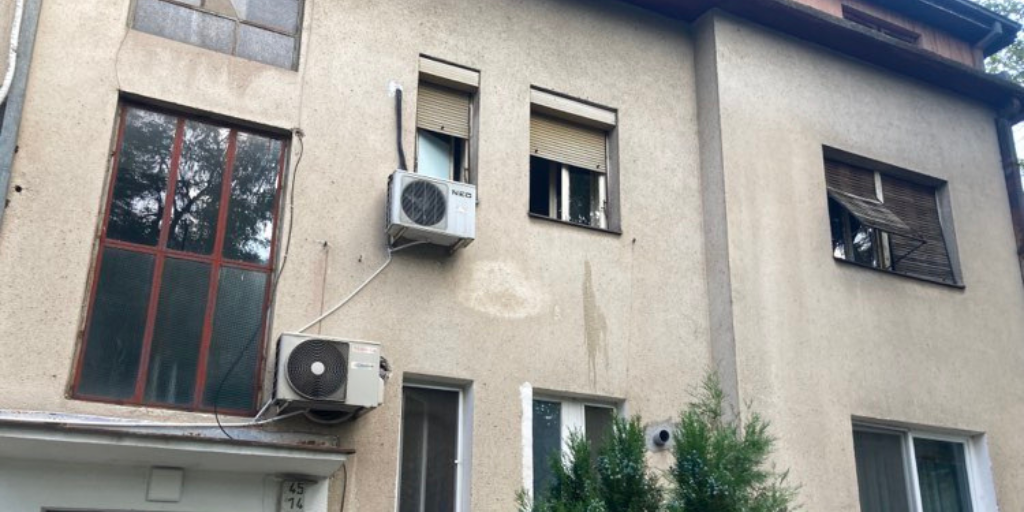Back in 2018, following a public call by the Centar municipality in Skopje, 26 buildings were approved to receive energy-efficient façades. Yet only one building has been retrofitted in five years, leaving the residents in the other 25 buildings back at square one, disheartened by the whole process and forced to look for other alternatives to insulate their old buildings.
Kristina Dimitrova, Energy transformation campaigner | 20 October 2023

Building on Franklin Ruzvelt 48 street, Skopje
In North Macedonia, local authorities are the key actors for the realization of energy efficiency goals in the residential sector, the largest final consumer of energy. Several authorities have already set up a subsidy scheme for retrofitting of existing residential buildings. For instance, the Centar municipality in Skopje has already had few calls for energy-efficient insulation of residential buildings in the central area of Skopje, but the results remain questionable.
The plan
In the public call from 2018, supported with financial resources from its budget, the municipality covered up to 70 percent of the total value of the energy-efficient multi-apartment residential building façade for each approved application. Out of 65 applications received, 26 buildings were approved, and were planned to be retrofitted within two years, according to media reports.
The reality
However, the results are far from those projected, with only one building retrofitted in five years. Despite this, the municipality published another public call this year in May with the same aim, clearly stating that with the publication of this new call, the one from April 2018 becomes invalid, as do the obligations deriving from it. This resulted in disappointment among the other selected applicants, who ended up without insulated homes.
An apartment owner living in one of the remaining 25 buildings who haven’t received new façades shared their frustrations with Bankwatch, requesting anonymity:
‘In May 2023, we were surprised to see a new public call on the Municipality’s website, when we still haven’t got a new façade. Until then, we were under the impression that retrofitting was still ongoing and that it was just a matter of time when we would be next. We were in disbelief when we found out that only one building has been retrofitted, out of 26 approved, since 2018! We feel like our time was wasted and are very much discouraged from applying for other subsidies of this kind.’
Local authorities must be leaders in implementing energy efficiency measures, not bystanders
It remains to be seen what exactly went wrong in this case, and we plan to investigate the issue in more depth in the coming months. But undeniably, sham measures that don’t fix people’s problems only cost them time and money, simultaneously contributing to greater distrust in government bodies and institutions.
In fact, municipalities must be the leaders in boosting energy efficiency measures, especially in the residential sector, and according to North Macedonia’s Energy Efficiency Law, they have a legal obligation to prepare an energy efficiency programme every three years. The development and implementation of these programmes remains a serious challenge in the country – a fact also noted by the European Commission. Some local authorities haven’t even developed such programmes, and those that have been done are of poor quality. Most often, the programmes do not contain the required elements given in the Energy Efficiency Law, or the identified measures are unrealistic, resulting in ineffective implementation.
Furthermore, as highlighted in June 2023 by the State Audit Office, most municipalities do not prepare implementation reports on their energy efficiency programmes and do not keep separate records to measure the efficiency of the implemented projects and the savings achieved.
The improper implementation is mostly due to a lack of qualified human resources responsible for energy sector projects and activities. In most cases, job positions covering energy efficiency haven’t been created or filled yet. If the capacity of a central municipality to manage an energy efficiency subsidy scheme results in only one building retrofitted in five years, we clearly can’t expect much from smaller local authorities.
Strengthening municipal capacities – It’s a must!
On 3 October, 2023, the Parliament adopted a Draft Law on Amendments and Additions to the Law on the Development Bank of North Macedonia proposed by the Ministry of Finance. The amendments enabled the establishment of an Energy Efficiency Fund with initial capital in the amount of EUR 5 million provided by the World Bank under the ongoing Public Sector Energy Efficiency Project. An additional EUR 10 million in green bonds were secured for the fund aimed at green projects, which in the future will be replenished from other sources for green investments. Legal entities and individuals in the country will receive support in the form of extended loans, issued guarantees and approved grants under the Energy Efficiency Fund.
This is indeed a step in the right direction of fulfilment of the established decarbonization goals of North Macedonia, determined in the National Energy and Climate Plan. The Energy Efficiency Fund will bring greater access to funds and a stronger responsibility for authorities to push forward the efficient use of energy in all relevant sectors. Thus, it is of utmost importance for local authorities to strengthen their administrative capacities with qualified and professional personnel who will create and implement realistic energy efficiency programmes.
Local authorities must strengthen inter-municipal cooperation as well, exchanging experiences and good practices. Moreover, monitoring and reporting the results of the implemented measures must become a regular practice within municipalities, since it not only helps with tracking the effectiveness of the measures and the savings achieved, but also shows greater transparency and accountability of managing public money.
Never miss an update
We expose the risks of international public finance and bring critical updates from the ground – straight to your inbox.
Theme: Energy efficiency
Location: North Macedonia
Project: District heating
Tags: energy efficiency
